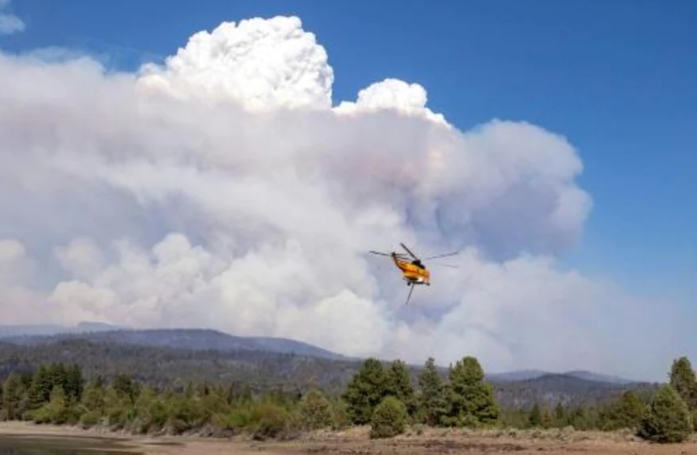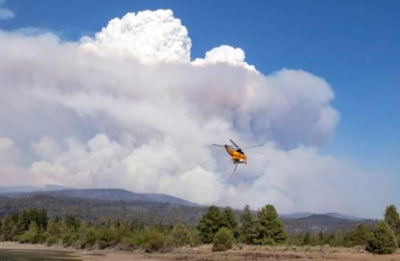The western United States, which has been severely affected by drought, is bracing for further devastation from wildfires on Friday, as efforts to contain a massive blaze in southern Oregon falter, and dangerous dry lightning is expected in California. The "Bootleg Fire," near the Oregon-California border, expanded overnight to 240,000 acres, larger than the size of New York City, marking the largest active fire in the United States, with only seven percent contained. Fire Chief Rob Allen stated, "The perimeter of the Bootleg Fire is over 200 miles (approximately 322 kilometers), which is a massive distance that complicates containment." He added, "We continue to utilize all available resources, from bulldozers to air tankers, to access areas where it is safe to operate, especially under the anticipated hot, dry weather and increasing wind conditions over the weekend."
Evacuation orders were issued on Thursday evening as firefighters were forced to retreat due to the rapid expansion of the flames and "extreme fire conditions" to the eastern part of the fire, which ignited 10 days ago and has grown by approximately 1,000 acres per hour since then. Frank Lee Smith, a resident who was evacuated in Klamath County, Oregon, said, "I was there. I saw the flames extending along the ridge for a mile (1.6 kilometers) towards our home, and I received a call to pack my things and leave, so I loaded as much as I could into the truck with my dog and we took off."
The fire also poses a risk to power supplies in neighboring California, threatening to plunge residents into darkness, as has happened in previous years during heatwaves that stressed the state’s electric grid. California Governor Gavin Newsom announced that additional reinforcements would be sent to assist in combating the Oregon fire even as California tries to extinguish its own fires, as stated by emergency services from the governor's office. The statement added, "The effects of climate change are contributing to increasingly dangerous and severe wildfires across the western United States."
Climate scientist Daniel Swain warned that the risk of wildfires ignited by anticipated dry lightning in California this weekend is "very high." In August of last year, the "Complex Fire," the largest in modern California history, destroyed an area the size of Delaware due to a massive series of thousands of lightning strikes. Swain, from UCLA, cautioned that due to "a prolonged period of record-high temperatures," California’s forests are drier than usual for late August or September. Although he noted on Twitter, "It is unlikely that a sequence of dry lightning will strike as it did in August 2020."
In Canada, around one hundred Mexican firefighters are expected to arrive in Toronto on Saturday to combat fires in northwestern Ontario, as provincial authorities announced on Friday. Air quality warnings have been issued in four provinces as the fires have created smoke clouds. Graham Leggett, 34, who works at the Art Gallery of Alberta in western Canada, remarked, "Everything is changing very quickly according to the winds." He explained to AFP, "By 8 AM yesterday, it was clear and sunny, and by 10, the air was so filled with smoke that you could barely see."
Canadian Environment Ministry tweeted, "Wildfire smoke is causing poor air quality in various areas" on Friday. Rory McLean, 34, a public library employee in Saskatoon, Saskatchewan, noted that smoke levels have worsened. He remarked, "I grew up here and I don't remember so many smoky days, but over the past ten years, it seems the number of wildfires has increased." Officials expect high temperatures to dominate from Alberta to Ontario over the next few days, though they will not be as extreme as the temperatures reaching 49.6 degrees Celsius recorded near Vancouver three weeks ago. Scientists have stated that the heatwaves impacting the western United States and Canada since late June would have been "practically impossible" without climate change caused by human activities. Climate change intensifies drought conditions, creating ideal circumstances for wildfires to spread uncontrollably, causing unprecedented material and environmental damage.




